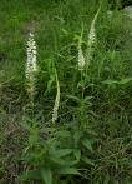|
Culvers Root exerts a gently strengthening effect on the bodyThe following information is directly quoted from the LINK BELOW. It is meant to be educational only...... this herb is an important ingredient in the cleansing herbs for the MOST IMPORTANT equine colic cure that I have used with 99.9999% success since 1977. Culvers root has a relaxant effect on the body to include a beneficial effect on the liver stimulating a normal bile flow. It is also a stomach tonic and helps with indigestion. It is a blood purifier and helps to cleanse the mucus membranes and congestion from the sinuses and throat. The herb must be used with caution because it contains leptandrin, a very strong purgative and emetic.

Scientific Name(s): Veronicastrum virginicum (L.) Farw. Syn: V. sibiricum L. Pennell, V. sibirica L., Leptandra virginica (Nutt.). Fam: Scrophulariaceae Common Name(s): Black root , black culver's root , physic root , bowman's root , brinton root , hini , leptandra , leptandra-wurzel , oxadody , tall speedwell , tall veronica whorlywort History-- The first documented use of culvers root was when Puritan leader Cotton Mather requested it as a remedy for his daughter's tuberculosis in 1716. It was used by early physicians as a powerful laxative and emetic. Native American tribes also used the plant and drank tea preparations to induce vomiting and to help cleanse the blood. Herbalists have used this herb for its ability to increase the flow of bile from the liver. It has been used as a liver tonic, for liver or gallbladder disorders, and to promote bile flow. It has also been used for various GI problems. Also, as a stomach tonic, aiding in digestion. It is used both for diarrhea and chronic constipation, and hemorrhoids as well. Actions: Cholagogue, hepatic, mild cathartic, diaphoretic, laxative, antispasmodic, tonic. Common Use: Used for any sign of liver problems, it is a great reliever of liver congestion, inflamed gall bladder, jaundice (when due to liver congestion) and chronic constipation when due to a liver dysfunction. Bodily Influence: Alterative: This herb cleanses, stimulates, and aids in the efficient removal of waste products Bitter: This herb stimulates secretion of digestion and encourages appetite Blood purifier: This herb cleanses the blood as well as enhances it by increasing the nutrient value Cathartic: This herb is a strong laxative which causes rapid evacuation Cholagague: This herb stimulates bile flow from the gall bladder and bile ducts into the duodenum Emetic: This herb causes vomiting Emmenagouge: This herb facilitates and regularizes menstrual flow. (Avoid during pregnancy) Emetic: This herb causes vomiting Hepatic: This herb supports and stimulates the liver, gall bladder, and spleen, and increase the flow of bile Laxative: This herb stimulates bowel movements Tonic: This herb restores, nourishes, and supports the entire body; it exerts a gently strengthening effect on the body.
|





